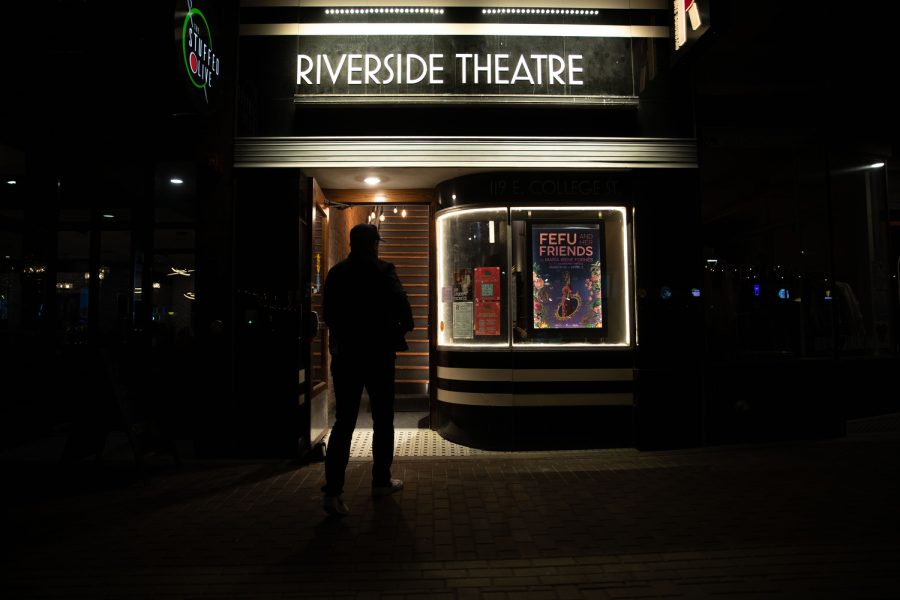While New York City is historically the hub for aspiring actors, two of Iowa City’s theater companies strive to provide work for theater artists and growing the city’s professional scene.
Riverside Theatre’s Producing Artistic Director, Adam Knight, spent 17 years working in the New York City theater industry as a producer and director before coming to Iowa City. He shared that it is typical for theater artists anywhere to hustle between paid and unpaid theater jobs, relying on day jobs to make ends meet.
In Iowa City, an actor’s fate may closely follow Knight’s observation. Though there are plenty of opportunities for budding actors, most are unpaid. Some will pay for transportation or a small honorarium, but few guarantee pay for their artists.
However, Riverside Theatre is among the few that ensure pay for its actors, even those who are just starting out.
Established in 1981, Riverside is a nonprofit resident theater company. According to Knight, the theater on average establishes an annual budget of $750,000 — 40 percent is expected from ticket sales and 60 percent expected from various grants and donations from patrons and external corporations.
Within the budget, weekly salaries are accounted for, and each person who works on any given show receives compensation regardless of whether a show turns a profit.
The performers’ compensation equates to either at or above $12.25 per hour, the Johnson County minimum wage.
Knight said he believes it’s important for actors to go out and experience working in major markets to develop their personal and professional values. When they return, places like Riverside provide compensation for world-class theater.
“I believe that Riverside puts more meaningful money in artists’ pockets than I was ever able to in New York,” Knight said.
After graduating from the University of Iowa in 2019, Iowa-based actor Mackenzie Elsbecker headed straight for New York City. However, Elsbecker was unlucky in her timing. Soon after arriving, the city was faced with restrictions from the COVID-19 pandemic that shut down its theaters.
Elsbecker returned to Iowa despite later plans to move back to the Big Apple, but after participating in a production with Theatre Cedar Rapids, a community theater in Cedar Rapids, she realized the value of working for a local professional scene and started working with Riverside earlier this year.
“As long as you’re enjoying what you’re doing, it doesn’t matter how you do it,” she said.
Weeks before COVID-19 shut down the entertainment industry, Willow Creek Theatre opened its company with a mission to “support local artists and make it possible for local artists to make a living and support themselves through their art.”
The local theater company was faced with a decision to either wait to reopen after things stabilized or push on and provide for artists at a time when they needed it the most.
RELATED: Floodwater Comedy Festival returns to IC after two years of cancellations
Artistic Director Luke Brooks co-founded Willow Creek after noticing a lack of opportunity for working artists in Iowa City. Rather than leaving for a major city, Brooks sought to make the opportunities present locally for himself and others.
“I grew up in this community, I love this community. I don’t want to leave it, I want to work here,” Brooks said.
Still in its early years, Willow Creek faces specific challenges in budgeting their year. Brooks shared that the company often doesn’t know what its budget will look like a few months ahead of time. It plans its season as carefully as possible to guarantee fair wages for performers.
The company offers its artists a deal of mutual risk. If an artist invests their time and energy in a mainstage production, they will receive 40 percent of ticket sales, regardless of whether the show profits.
Investing in the professional arts scene is to build it. Riverside’s 42-year track record of investing in local artists has enriched the Iowa City theater scene. Willow Creek’s dedication to its artists is a leading example of how compensating artists at any level has a positive impact on the community as a whole.
“The more theaters that are supporting artists, the easier it is for any one artist to stick around year-round,” Brooks said.



